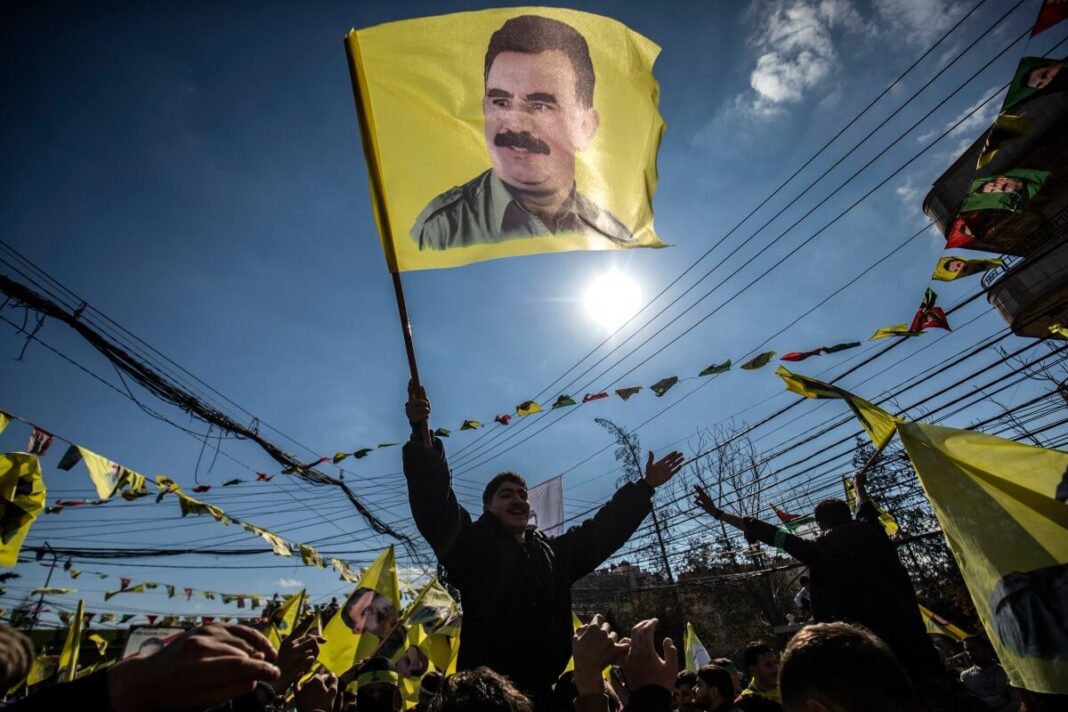Abdullah Öcalan, the jailed founder of the outlawed Kurdistan Workers’ Party (PKK), is an icon to many Kurds, but a “terrorist” to many within wider Turkish society.
He called for his Kurdish militant group to lay down its arms and disband, in a landmark declaration read out in İstanbul on Thursday.
Now 75, Öcalan has been held in solitary confinement since 1999 on İmralı prison island near İstanbul.
Since the last peace efforts broke down in 2015, Öcalan has spent almost a decade without any political contact.
But since October, when Turkey tentatively moved to reset ties with the PKK, Öcalan has been visited three times by lawmakers from the pro-Kurdish Peoples’ Equality and Democracy Party (DEM Party)
For most Turks, Öcalan is public enemy number one for his role in leading the PKK.
In 1978, he founded the group which six years later began an insurgency demanding independence and, more recently, broader autonomy in Turkey’s mostly Kurdish southeast. Tens of thousands of people have died.
A Marxist-inspired group, it is blacklisted as a “terrorist” organization by Turkey, the United States, the European Union and many other Western countries.
An olive branch
Attitudes began shifting in October when far-right Nationalist Movement Party (MHP) leader Devlet Bahçeli, a close ally of President Recep Tayyip Erdoğan, offered Öcalan an olive branch if he would publicly renounce terror.
The next day, the former guerrilla who embodies the decades-long Kurdish rebellion, received his first family visit in four years.
He sent back a message saying he alone could shift the Kurdish question “from an arena of conflict and violence to one of law and politics” later offering assurances he was “ready to take the necessary steps and make the call.”
Ankara’s bid to reopen dialogue came just weeks before Syrian rebels overthrew Bashar al-Assad, upending the regional balance of power and thrusting Turkey’s complex relationship with the Kurds into a new spotlight.
From village life to militancy
Öcalan was born on April 4, 1949, one of six siblings in a mixed Turkish-Kurdish peasant family in Ömerli, a village in Turkey’s southeast.
His mother tongue is Turkish.
He became a left-wing activist while studying politics at university in Ankara, and was first jailed in 1972.
He set up the PKK six years later, then spent years on the run, launching the movement’s armed struggle in 1984.
Taking refuge in Syria, he led the fight from there, causing friction between Damascus and Ankara.
Forced out in 1998, he moved from Russia to Italy to Greece in search of a haven, ending up at the Greek consulate in Kenya, where US agents got wind of his presence and tipped off Turkey.
He was arrested on February 15, 1999 after being lured into a vehicle in a Hollywood-style operation by Turkish security forces.
Sentenced to death, he escaped the gallows when Turkey started abolishing capital punishment in 2002, living out the rest of his days in isolation on İmralı prison island in the Sea of Marmara near İstanbul.
For many Kurds, he is a hero whom they refer to as “Apo” (uncle). But Turks often call him “bebek katili” (baby killer) for his ruthless tactics, including the bombing of civilian targets.
Jailed but still leading
With Öcalan’s arrest, Ankara thought it had decapitated the PKK. But even from his cell, he continued to lead, ordering a ceasefire that lasted from 1999 until 2004.
In 2005, he ordered followers to renounce the idea of an independent Kurdish state and campaign for autonomy in their respective countries.
Tentative moves to resolve Turkey’s “Kurdish problem” began in 2008, and several years later, Öcalan became involved in the first unofficial peace talks when Erdogan was prime minister.
Led by then spy chief Hakan Fidan — who is now foreign minister — the talks raised Kurdish hopes for a solution with their future within Turkey’s borders.
But the effort collapsed in July 2015, sparking one of the deadliest chapters in the conflict.
The government has defended its de facto silencing of Öcalan, saying he failed to convince the PKK of the need for peace.
Seen as the world’s largest stateless people, Kurds were left without a country when the Ottoman Empire collapsed after World War I.
Although most live in Turkey, where they make up around a fifth of the population, the Kurds are also spread across Syria, Iraq and Iran.
Turkey’s wide-scale use of combat drones has pushed most Kurdish militants into northern Syria and Iraq, where Ankara has continued raids.
© Agence France-Presse



